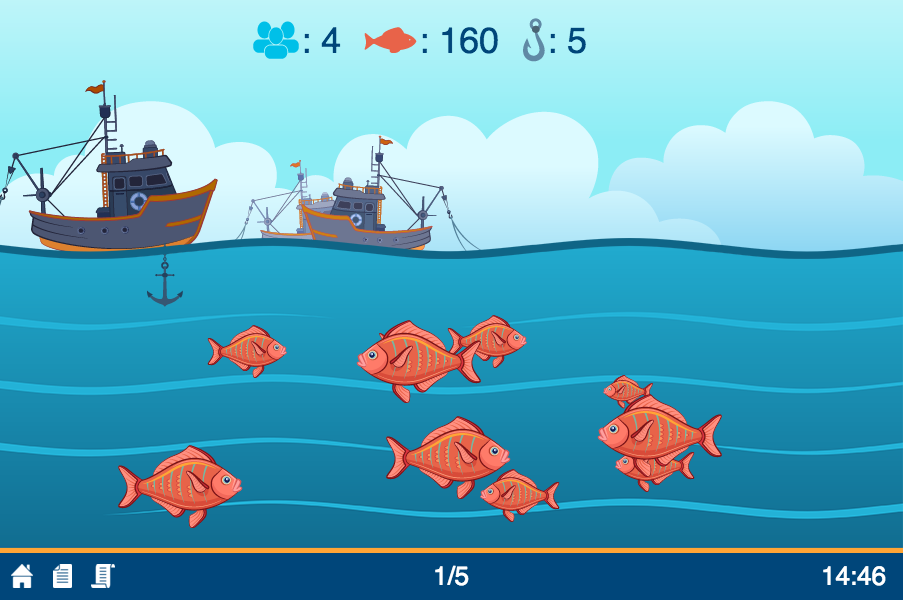Elinor “Lin” Ostrom is my favorite economist. In 2009, she was the first woman to win the Nobel Prize in Economics for “her analysis of governance, especially the commons.” The “commons” refers to a resource that can be used by several people, but each person’s use subtracts from what is available for the rest of the people.
MobLab has multiple games that are inspired by several economists, including Ostrom. For example, our Commons: Fishery game consists of three configurations that can help students gain a deeper understanding about the tragedy of the commons. In this game, students operate a fishing boat on the sea and cast their nets to catch fish. There is a maximum capacity of fish in the sea and the fish population doubles at the end of each season.
The commons is fundamentally about having too few property rights. Because each person can fish the lake, graze the pasture, take the water, etc. there are incentives for each person to take the resources before the other person gets them all. We recommend you first create perfect property rights by having students in the game be the only ship on the sea. This can be done by setting the Group Size to one. After running that game, you can run it again with the standard Group Size of four and have a fun conversation about how property rights provide incentives to consume at a more sustainable clip.

Second, another important aspect of the commons is the role of covenants or agreements about how much to use the resource. With MobLab interactive economics games you can allow students to chat with each other within the game to make these agreements by checking the Allow Chat box. Even though these covenants are simply students talking to one another via chat, in her own laboratory research, Elinor Ostrom found that interested parties talking to one another improved cooperation and reduced tragedy in the commons.

Third, you can also configure whether the game is repeated in the MobLab instructor console settings. When the game is repeated, cooperation is greater because players expect to receive a greater stream of benefits from future cooperation.
Would you like to learn more about MobLab interactive economics games? Get in touch with our team. Click here to schedule a one-on-one demo meeting.
MobLab has multiple games that are inspired by several economists, including Ostrom. For example, our Commons: Fishery game consists of three configurations that can help students gain a deeper understanding about the tragedy of the commons. In this game, students operate a fishing boat on the sea and cast their nets to catch fish. There is a maximum capacity of fish in the sea and the fish population doubles at the end of each season.
The commons is fundamentally about having too few property rights. Because each person can fish the lake, graze the pasture, take the water, etc. there are incentives for each person to take the resources before the other person gets them all. We recommend you first create perfect property rights by having students in the game be the only ship on the sea. This can be done by setting the Group Size to one. After running that game, you can run it again with the standard Group Size of four and have a fun conversation about how property rights provide incentives to consume at a more sustainable clip.

Second, another important aspect of the commons is the role of covenants or agreements about how much to use the resource. With MobLab interactive economics games you can allow students to chat with each other within the game to make these agreements by checking the Allow Chat box. Even though these covenants are simply students talking to one another via chat, in her own laboratory research, Elinor Ostrom found that interested parties talking to one another improved cooperation and reduced tragedy in the commons.

Third, you can also configure whether the game is repeated in the MobLab instructor console settings. When the game is repeated, cooperation is greater because players expect to receive a greater stream of benefits from future cooperation.
Would you like to learn more about MobLab interactive economics games? Get in touch with our team. Click here to schedule a one-on-one demo meeting.


